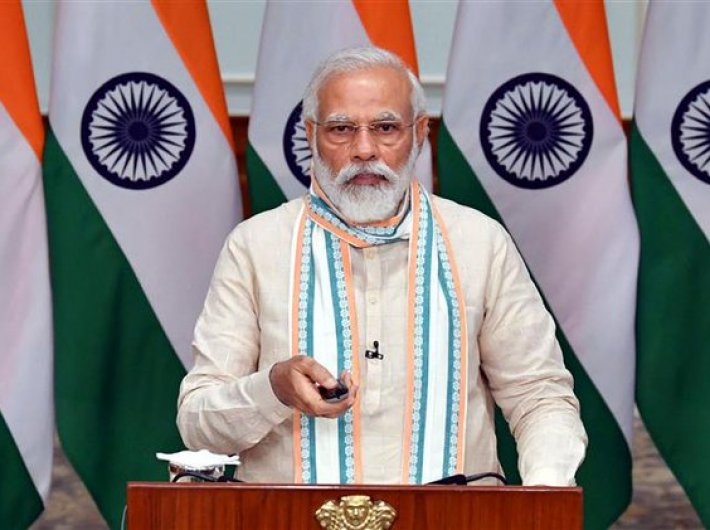Aggressive push for Self-Reliance mission, launched earlier, to truncate Chinese firms’ presence
For all intents and purposes, India is going to reset its relations with China and a subtle hint to this regard has been given by the Narendra Modi government after the deadly June 15/16 night face-off between the Indian army and PLA troops in the Galwan Valley in which 20 Indian soldiers lost their lives.
From political to economic to strategic, at every level India has started mulling changes in the rules of the game against China. On the economic front, initiatives are being taken to promote Indian business which could fill the market space so far occupied by the Chinese companies. In this regard, push is coming directly from the Prime Minister’s Office.
On June 28, emphasizing on the need of self-reliance, prime minister Modi in his monthly ‘Man Ki Baat’ radio programme said, “No mission can be successfully achieved without people’s participation. And that is why, on the path towards a self-reliant India, as a citizen, our collective resolve, commitment and support is necessary, rather imperative.”
He linked self-reliance with the requirement of the country to strengthen itself. “We should also remember that the stronger our country is, the possibilities of peace in the world will proportionately be bolstered.” Incidentally, the government had launched the Atma Nirbhar Bharat, or Self-Reliant India, mission earlier, in response to the economic downturn along side the Covid-19 pandemic and the lockdown.
In the meanwhile, to check the free flow of Chinese goods, a slew of measures, including erecting tariff barriers have been planned.
The telecom ministry has already directed state-run and private telcos to stop using Chinese equipment while pushing the public sector telecom giant BSNL to cancel Rs 8,697 crore 4G tender in which China’s equipment manufacturer ZTE had participated. The Chinese company Huawei’s plan to enter the 5G market of India and consolidate its base in the country also seems dashed. Again, the security reason is cited for keeping Huawei away from the Indian market.
There is a buzz in the corridors of the power ministry that Chinese companies should be debarred from making entry into India’s mass smart metering programme. The state-run Energy Efficiency Services Ltd (EESL) has been reportedly told to avoid using Chinese meters. The centre wants to convert all electricity meters into smart prepaid meters by 2022.
Similarly, the Indian railways has decided to cancel Rs 471 crore signaling project awarded to China Railways Signal & Communications Co. Ltd. Though this decision has been spurred by the ghastly incident of the Galwan Valley, the railways were mulling to terminate the contract with the Chinese company for long.
The contract for signalling and telecommunication work in the 417-km Kanpur-Deen Dayal Upadhyay station section of the freight corridor was awarded in 2016. Since then the Chinese company had completed only 20 percent of the work.
Coupled with tardy pace of work, the current growing anti-China sentiment after the June 15 Galwan Valley incident prompted the railways to scrap the project. Yet there is a hurdle. Since the funding for the project was done by the World Bank, railways authorities have to approach the international financial institution for its termination.
But the Mumbai Metropolitan Region Development Authority (MMRDA) couldn’t bat an eyelid in cancelling the bid to manufacture 10 monorail rakes by Chinese companies-CRRC Corporation Ltd and BYD Co Ltd.
Along with all this, moves have been taken to properly scrutinise all imported goods from China at seaports and airports before being given them custom clearances. Besides, plans are afoot to impose higher trade barriers and raise import duties on products imported from China.
According to a Bloomberg news report, the state-run Bureau of Indian Standards (BIS) is finalising tougher norms for at least 370 products to ensure items that can be locally produced are not imported. The products include chemicals, steel, electronics, heavy machinery, furniture, paper, industrial machinery, rubber articles, glass, metal articles, pharmaceutical products, fertilizer and plastic toys. China is India’s biggest source of imports, with purchases in electronic goods, industrial machinery and organic chemicals running into $70 billion last year.
China’s Global Times newspaper, finding it hard to digest the ongoing call by Indians to shun Chinese goods, maintained in its write-up on June 24 that “Challenging the dominance of small Chinese goods in the Indian market would be to challenge the market itself.” It also said that India waging a trade war with China is like “throwing an egg at a rock.” Experts view it differently. They say the anti-India propaganda in its media is a reflection of China’s anxiety as India is considered a lucrative market for the cheap Chinese goods. However, push came to the shove when India changed Foreign Direct Investment rules in April.
With the objective of preventing opportunistic takeover of firms hit by the pandemic-induced lockdown, the centre changed the FDI rules. Under the changed rules and regulations of FDI, an entity of a country that shares a land border with India can invest in firms in the country only under the government route. This infuriated China and termed the move as a violation of the World Trade Organisation (WTO) principles.
But India is determined to promote self-reliance, while at the same time making China realise that it will have to pay the cost of barbarity in the Galwan Valley.

